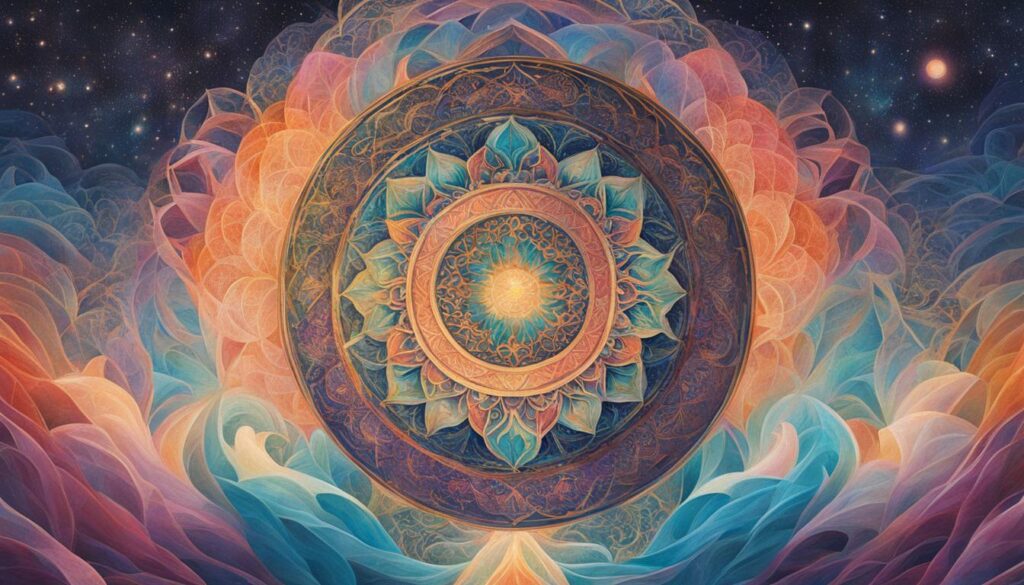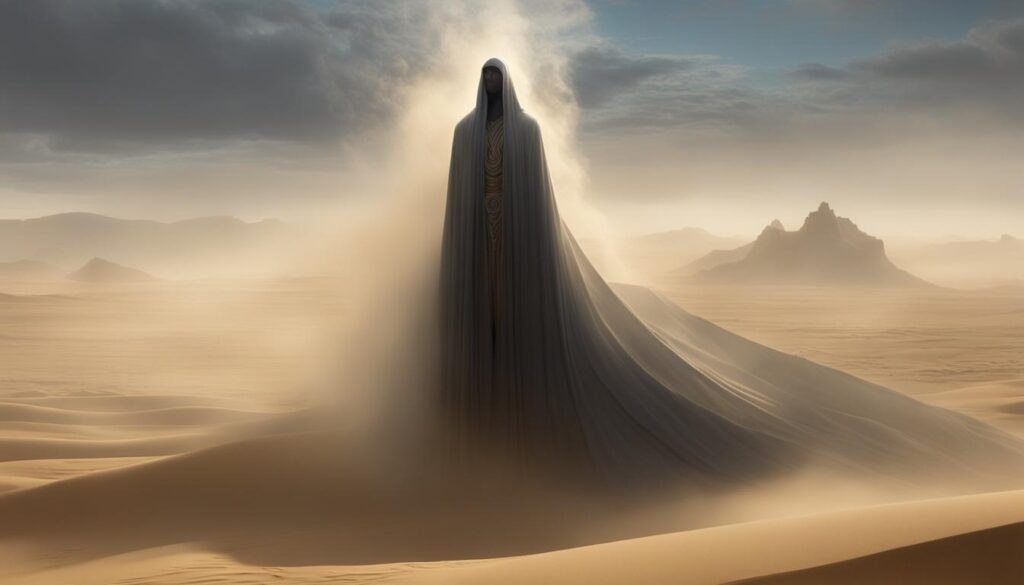In Islam, there exists a rich tapestry of beliefs and teachings that delve into the mystical realm of angels and jinn. These supernatural beings, often referred to as celestial entities, hold significant importance in Islamic tradition, serving as divine messengers and spiritual entities. Understanding the intricacies surrounding angels and jinn can provide profound insights into the invisible realm that interconnects with our physical world.
Key Takeaways:
- Angels and jinn play crucial roles in Islamic belief as supernatural beings that bridge the gap between the physical and spiritual realms.
- Islamic cosmology sets the foundation for understanding the hierarchy and belief system surrounding angels and jinn.
- Angels are viewed as divine messengers with distinct responsibilities, while jinn are considered spiritual entities.
- The origins of angels in Islamic tradition point towards their creation by Allah, the supreme divine being.
- Jinn folklore and its evolution throughout Islamic history also hold significant cultural and spiritual value.
The Intricate Belief System of Supernatural Beings in Islam
Islamic cosmology forms the foundation of the intricate belief system surrounding supernatural beings in Islam. It encompasses a comprehensive understanding of the universe, which includes the existence of celestial entities, angels, and jinn. As followers of Islam delve into the depths of their faith, they encounter a spiritual hierarchy and a deep-rooted belief system that shape their perception of these mystical beings.
Islamic cosmology depicts a multidimensional universe where various realms coexist. It acknowledges the material world, the world of angels, and the world of jinn. These spiritual dimensions exist alongside our physical reality, each serving a specific purpose within the divine plan. Such cosmology emphasizes the interconnectedness of these realms, highlighting the intricate relationship between human beings and supernatural beings.
Within the Islamic belief system, the spiritual hierarchy further enriches the understanding of supernatural beings. Muslims recognize the existence of different levels of existence, each with distinct characteristics and responsibilities. At the pinnacle of this hierarchy stands Allah, the one and only God. Below Him are the angels, celestial entities created from light, who serve as messengers and carry out divine commands.
The belief in the spiritual hierarchy extends to the jinn, another class of supernatural beings in Islam. Jinn are created from smokeless fire and occupy a different realm. They possess free will and, much like humanity, are subject to the test of faith. Understanding this intricate belief system is essential to comprehending the roles and significance of angels and jinn within Islamic tradition.
Let us now explore the Islamic cosmology in more detail and gain a deeper understanding of the spiritual hierarchy that shapes the belief system surrounding supernatural beings.
| Key Concepts | Description |
|---|---|
| Islamic Cosmology | A comprehensive understanding of the universe that includes the existence of celestial entities, angels, and jinn. |
| Spiritual Hierarchy | A hierarchical structure that depicts the different levels of existence within Islamic tradition, from Allah to angels and jinn. |
| Interconnected Realms | An acknowledgement of the coexistence of various realms, including the material world, the world of angels, and the world of jinn. |
Angels and Jinn: Divine Messengers and Spiritual Entities
In Islamic tradition, angels and jinn are regarded as divine messengers and spiritual entities that play significant roles in the supernatural realm. They exist in the invisible realm, beyond human perception, and interact with both the celestial world and humanity. Understanding the definition, characteristics, roles, and functions of angels and jinn is crucial to comprehending the mystical aspects of Islamic belief.
Definition and Characteristics
Angels, known as “malāʾikah” in Arabic, are celestial beings created by Allah (God). They are made of pure light, and their existence is purely spiritual. Angels are described as beings of great beauty and purity, possessing immense knowledge and power. They are free from human limitations such as hunger, fatigue, and mortality. Jinn, on the other hand, are supernatural creatures created from smokeless fire or “mārija min-nār.” They possess free will and can choose between good and evil. Jinn have the ability to shape-shift and can interact with both the visible and invisible worlds.
Roles and Functions
Angels serve as messengers of Allah and facilitators of divine revelation. It is believed that they convey Allah’s messages to prophets, including the revelations of the holy scriptures. Angels also perform various tasks assigned to them, such as recording human actions, protecting individuals, and delivering blessings. Jinn, on the other hand, have diverse roles in Islamic tradition. They can influence human thoughts and actions, both positively and negatively. Jinn can also serve as intermediaries between humans and the celestial realm, assisting in spiritual matters.

Exploring the intricate nature of angels and jinn as divine messengers and spiritual entities unveils the profound spiritual dimensions of Islamic beliefs. Their presence and influence provide believers with a connection to the divine realm, inspiring devotion, guidance, and protection.
The Celestial Entities: Who Created Angels in Islamic Tradition
In Islamic tradition, angels are believed to be celestial entities created by Allah. According to Islamic beliefs, Allah is the ultimate creator and source of all existence, including angels. Angels are considered divine messengers and spiritual beings that reside in the unseen realm, performing various tasks and fulfilling the commands of Allah.
The creation of angels is a testament to the immense power and wisdom of Allah. They are described as beings of pure light and perfection, created with the purpose of serving and worshipping Allah. Angels are believed to possess qualities of purity, obedience, and loyalty, making them ideal messengers and intermediaries between Allah and humanity.
Islamic teachings highlight the significance of angels and their role in maintaining the balance of the universe. They are regarded as instruments of divine will, carrying out duties such as delivering revelations to prophets, recording human deeds, guarding individuals, and managing natural phenomena.
“And they say: ‘The Most Merciful has taken [for Himself] a son.’ You have done an atrocious thing. The heavens almost rupture therefrom and the earth splits open and the mountains collapse in devastation. That they attribute to the Most Merciful a son. And it is not appropriate for the Most Merciful that He should take a son. There is no one in the heavens and earth but that he comes to the Most Merciful as a servant.”
Through the Quran and Hadiths (sayings of the Prophet Muhammad), Islamic teachings provide insights into the origins and nature of the celestial entities. The creation of angels is considered to be a unique manifestation of Allah’s divine wisdom and purpose. They serve as a reminder of Allah’s power, knowledge, and benevolence, instilling a sense of awe and reverence in the hearts of believers.
Islamic scholars and theologians have written extensively about the celestial entities and their significance in Islamic tradition. Their writings explore the celestial realm, the hierarchy of angels, and the intricate relationship between angels, jinn, and human beings. These discussions shed light on the spiritual aspects of Islamic faith and deepen believers’ understanding of the unseen realm.
The Invisible Realm: Jinn Folklore and Islamic Teachings
The mysterious world of jinn holds a prominent place in Islamic teachings and folklore. Exploring the rich cultural heritage of jinn beliefs provides invaluable insights into Islamic tradition, offering a glimpse into the pre-Islamic roots that shaped these fascinating supernatural beings.
While the concept of jinn predates Islam, it was through Islamic teachings that their significance became deeply intertwined with faith and spirituality. Jinn folklore, passed down through generations, offers a captivating narrative of these invisible entities that coexist alongside human beings.
Pre-Islamic Arabia was steeped in superstitions and polytheistic beliefs, where jinn were worshiped as deities, feared as malevolent spirits, or revered as noble protectors. With the advent of Islam, these pre-existing notions were reconciled and incorporated into the Islamic worldview.
“And I did not create the jinn and mankind except to worship Me.”
Islamic teachings address the origins, characteristics, and interactions of jinn, seeking to demystify their existence and establish a harmonious understanding. The Qur’an serves as a primary source, shedding light on the nature and purpose of these enigmatic beings.
The evolution of jinn beliefs within Islamic history can be traced through various cultural expressions, folklore, art, and literature. Stories of encounter with jinn, mystical experiences, and their influence on human lives have been passed down through generations, captivating and inspiring believers.
The invisible realm inhabited by jinn serves as a reminder of the unseen dimensions beyond our everyday reality and emphasizes the importance of maintaining a spiritual connection with the divine. Understanding jinn folklore and its roots in pre-Islamic times not only enriches our cultural knowledge but also deepens our appreciation for the intricate tapestry of Islamic teachings.

Next, we delve into the duties and responsibilities of the angelic realm, offering valuable insights into their role as celestial entities. Join us for Section 6: Duties of Angels: Roles and Responsibilities, as we explore their divine presence and guardian duties.
Duties of Angels: Roles and Responsibilities
In Islam, angels play a crucial role in the celestial realm, fulfilling various duties and responsibilities as directed by Allah. Their angelic presence is believed to bring about a sense of guardianship and protection, both for individuals and the broader spiritual landscape.
During the revelation of the Qur’an to the Prophet Muhammad, angels served as intermediaries between Allah and His messenger. They delivered divine messages and guidance, ensuring the preservation and dissemination of the sacred teachings. In this way, angels acted as divine messengers, facilitating the communication between the heavenly realm and humanity.
Furthermore, angels are assigned the responsibility of guarding and protecting human beings. With their boundless knowledge and innate purity, they act as guardians of individuals and communities, working behind the scenes to shield believers from harm and guide them towards righteousness. Their watchful presence offers a source of comfort and solace to those who seek divine guidance.
Additionally, angels carry out the tasks of recording the deeds of humans, both good and bad. They meticulously document each person’s actions and intentions, forming a comprehensive account that will be presented on the Day of Judgment. This duty of record-keeping highlights the role of angels as impartial witnesses, ensuring ultimate justice and accountability in the afterlife.
It is important to note that angels do not possess free will; rather, their sole purpose is to carry out Allah’s commands. They adhere unwaveringly to divine instructions, executing their duties with unwavering obedience and devotion.
“Indeed, those who are near your Lord are not prevented by arrogance from His worship, and they exalt Him and to Him they prostrate.”
– Surah Al-Araf [7:206]
As believers reflect on the roles and responsibilities of angels, they are reminded of the angelic presence that surrounds and protects them. The knowledge of these celestial beings provides reassurance and inspiration, nurturing a sense of spiritual connectedness and encouraging individuals to strive for righteousness.
Role of Jinn in Islam: Between Myth and Faith
In Islamic belief and practice, the role of jinn occupies a significant place, existing at the intersection of myth and faith. Jinn, also known as genies, are supernatural beings believed to inhabit a parallel invisible world alongside human beings and angels. They are often portrayed as mischievous, powerful entities with the ability to shape-shift and influence the lives of humans.
The Quran, the central religious text of Islam, mentions jinn and their interactions with humans on multiple occasions. While their exact nature and purpose are a subject of debate, jinn are generally considered to be sentient beings with free will and the ability to choose between good and evil.
The myth surrounding jinn in Islamic tradition often involves tales of supernatural abilities, magical powers, and transformative appearances. These stories have captivated the imagination of believers and have become an integral part of Islamic folklore.
However, it is important to note that jinn hold a significant place in Islamic faith as well. Believers attribute various roles to them, including spiritual companions, protectors, and test administrators. Some Muslims seek solace in seeking the assistance of jinn for relief from afflictions or guidance in spiritual matters.
The belief in jinn is deeply rooted in Islamic culture and has influenced various aspects of Islamic practice. Rituals such as exorcism and protective amulets are carried out with the belief that they can ward off evil jinn and provide protection against their malevolent influence.
The role of jinn in Islam is a subject of intrigue and fascination, blending mythology and religious belief. It serves as a reminder of the unseen forces that shape the human experience and highlights the dynamic nature of faith in the Islamic tradition.

Understanding the Differences: Jinn vs. Human Beings
In the realm of Islamic belief, there exist supernatural beings known as jinn and human beings. While sharing the same world, jinn and humans differ in various aspects, such as their free will and living spaces. Exploring these differences offers insights into the parallel invisible world inhabited by jinn.
Firstly, the concept of free will differentiates jinn from human beings. In Islamic tradition, humans possess the ability to make choices and exercise free will, enabling them to shape their lives and determine their destinies. Conversely, jinn also possess free will, allowing them to make their own decisions and actions.
Living spaces further distinguish jinn from humans. While humans dwell in the physical realm, jinn exist in a parallel invisible world. This realm remains unseen to human eyes, yet affects and interacts with the physical world. Jinn are believed to inhabit desolate places, abandoned houses, and remote areas, where they live their lives independently from humans.
To visually represent the parallel invisible world where jinn reside, here’s an image:
This image provides a captivating glimpse into the mysterious and hidden world of jinn, depicting their presence in the invisible realm that coexists with our own.
By understanding the differences in free will and living spaces between jinn and human beings, we gain a deeper appreciation for the complexity of the supernatural realm. The parallel invisible world inhabited by jinn remains a source of fascination and intrigue, inviting us to explore further and broaden our understanding of the mystical aspects of Islamic tradition.
The Angelic Hierarchy: Classification and Levels
In Islam, angels are believed to be part of a complex hierarchy that spans different levels of existence. Understanding this classification system is essential for comprehending the roles and functions of angels in Islamic tradition. Renowned angels hold significant importance in the celestial realm, fulfilling vital responsibilities and serving as messengers of divine guidance.
The angelic hierarchy in Islam consists of various levels, each with its own distinct characteristics and responsibilities. At the top of this celestial order are the archangels, also known as the Malakut, who possess immense power and knowledge. These archangels are entrusted with carrying out important missions and delivering messages from Allah to the mortal realm.
The archangels are considered to be among the most revered and powerful beings in Islamic belief, representing the epitome of virtue, wisdom, and divine presence.
One of the most renowned angels in Islamic tradition is Jibreel (Gabriel), who serves as the chief messenger of Allah and is responsible for delivering revelations to prophets. Jibreel plays a pivotal role in the angelic hierarchy and is regarded as one of the closest beings to Allah.
Another prominent angel is Michael (Mikail), who is associated with activities related to sustenance and mercy. Michael’s responsibilities include overseeing natural phenomena and ensuring the well-being of human beings.
Israfil holds a significant position in the angelic hierarchy, as he is entrusted with the task of blowing the horn on the Day of Judgment, signaling the end of the world and the resurrection of all souls.
Azrael, known as the Angel of Death, plays a crucial role in the transition from earthly life to the afterlife. Azrael facilitates the separation of the soul from the physical body and guides individuals through the process of death.
Mystical Interactions: How Angels and Jinn Influence Humanity
Angels and jinn, as mystical and spiritual beings, have a profound influence on humanity. Their interactions with human beings go beyond the ordinary realm, creating profound experiences and shaping the course of individuals and societies alike.
These supernatural entities engage with humanity in various ways, their influence reaching deep into the spiritual and physical aspects of life. Through mystical interactions, angels and jinn leave an indelible mark on individuals, transforming their perceptions and guiding their actions.
Encounters with angels and jinn often result in profound spiritual awakenings and enlightenment. Through divine intervention and communication, angels deliver messages of guidance, protection, and solace to those who are receptive to their presence.
On the other hand, interactions with jinn can be more complex. Stories of mischievous jinn manipulating events and influencing human behavior have been part of Islamic folklore for centuries. These encounters offer lessons about the importance of spiritual discernment and the power of human will.
“The encounter with angels and jinn is a paradigmatic experience that challenges our understanding of reality and the nature of existence. It invites us to contemplate the mystical dimensions of our lives and the profound interconnectedness between the seen and the unseen.”
Furthermore, the influence of angels and jinn extends beyond individual experiences. They can impact society as a whole, contributing to the development of cultures, religions, and belief systems. The mystical encounters shared by communities and the collective understanding of angels and jinn shape the fabric of societies, inspiring art, literature, and spiritual practices.
As humans navigate the complexities of life and seek deeper meaning, the influence of angels and jinn remains an enigmatic force. Their mystical interactions continue to fascinate and intrigue, inviting individuals to explore the profound implications of their presence in the world.
Conclusion
After delving into the mystical realm of angels and jinn in Islam, it becomes clear that integrating knowledge about these celestial entities is of utmost importance in contemporary faith. Throughout this article, we have explored the intricate belief system of supernatural beings in Islam, understanding their roles as divine messengers and spiritual entities.
The celestial entities, including angels and jinn, hold a significant place in Islamic tradition. Reflecting on their origins and the creation of angels, we gain a deeper understanding of the invisible realm and the pre-Islamic roots of jinn folklore. These teachings have evolved over time, leading to a unique and comprehensive belief system that encompasses both myth and faith.
By comprehending the differences between jinn and human beings, we discover the parallel existence of jinn in an invisible world. Understanding their free will and living spaces sheds light on their intricate role in the cosmic order. Alongside angels, jinn have the power to influence humanity through mystical interactions, impacting individuals and society as a whole.
Integrating knowledge of angels and jinn into contemporary faith provides a pathway for spiritual growth and enlightenment. The mystical teachings embedded within Islamic tradition offer a profound opportunity for individuals to deepen their connection with the divine. By immersing oneself in the wisdom of angels and jinn, seekers can embark on a transformative journey towards spiritual growth, ultimately enriching their lives.
FAQ
What are angels and jinn in Islamic belief?
In Islamic belief, angels and jinn are supernatural beings or celestial entities that exist in the spiritual realm. Angels are considered divine messengers and spiritual entities, while jinn are mystical beings with their own distinct characteristics. Both angels and jinn play important roles in Islamic tradition and belief.
Who created angels and jinn in Islamic tradition?
According to Islamic teachings, angels were created by Allah (God) and serve as His obedient servants and messengers. The origins of jinn, on the other hand, are believed to predate the creation of human beings, and they were also created by Allah. In Islamic cosmology, angels and jinn are part of the celestial entities created by Allah to fulfill specific purposes in the universe.
What is the role of angels in Islam?
Angels have various roles and responsibilities in Islam. They serve as messengers of Allah, delivering revelations to prophets and guiding humanity. They also play a role in guardianship and protection, providing assistance to believers and interceding on their behalf. Angels are present during moments of divine revelation and are believed to witness the actions of mankind.
How do jinn fit into Islamic belief and practice?
Jinn hold a distinct place in Islamic belief and practice. They are invisible beings that coexist with humans but reside in their own parallel invisible world. Jinn are known for their free will and are capable of both good and evil actions. While some jinn may become followers of Islam, others may choose to deviate from the straight path, leading to their own spiritual consequences.
What is the angelic hierarchy in Islam?
In Islam, angels are believed to have a hierarchical structure. The most renowned angels include Jibreel (Gabriel), who is responsible for delivering Allah’s revelations to prophets, Michael, who oversees natural phenomena, Israfil, who will blow the trumpet on the Day of Judgment, and Azrael, the angel of death. These angels have distinct roles and responsibilities within the celestial hierarchy.
How do angels and jinn interact with and influence humanity?
Angels and jinn can have interactions and influence over humanity in different ways. Angels, as envoys of Allah, deliver messages and guidance, assist believers in times of need, and record human actions. Jinn, on the other hand, have the ability to affect humans through both positive and negative means. Understanding these interactions is crucial in the Islamic belief system.
Why is it important to integrate knowledge about angels and jinn in contemporary faith?
Integrating knowledge about angels and jinn in contemporary faith is significant for believers as it enhances their understanding of the unseen spiritual realms and the interconnectedness of the physical and spiritual worlds. Knowledge about angels and jinn can provide insights into the divine plan, inspire spiritual growth, and deepen one’s relationship with Allah.
What are the mystical teachings about angels and jinn for spiritual growth and enlightenment?
The mystical teachings about angels and jinn emphasize the importance of recognizing and engaging with the spiritual dimensions of existence. By studying the roles, characteristics, and interactions of angels and jinn, individuals can seek spiritual growth and enlightenment, finding guidance, protection, and inspiration in their relationship with Allah and the unseen world.
